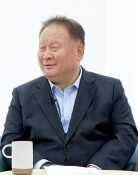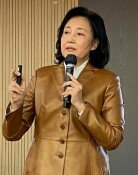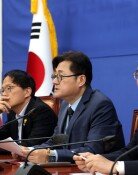Can Education Minister with plagiarism scandal have authority?
Can Education Minister with plagiarism scandal have authority?
Posted June. 18, 2014 05:25,
Kim Myung-soo, nominee for deputy prime minister for society and education minister, was found to have published a research paper in a journal as if he conducted the study, after summarizing a dissertation of his student. He was also found to have enlisted the paper in question in the Korea Research Information as an independent publication of his own. As Kim has been found to have taken free ride on a research paper by his student to follow suit of Song Gwang-yong, the new senior presidential secretary for education and culture, people have mounting doubt whether the two top education officials under the Park Geun-hye administration are qualified to lead the nations education administration.
The mentor professor and a student are a relationship of master and servant, in which the latter hardly can resist order from the former. How many students in Korean society could be bold enough to reject if the mentor professor asks them for a paper to publish in a journal by exploiting the professor`s superior status? Even if Kim made important contributions to the study through guidance of the student, it is just his inherent obligation as mentor professor.
The Grand National Party (current Saenuri Party) got Song Ja, former Yonsei University president, and Kim Byung-joon, former senior presidential secretary for policy, fail in confirmation hearings as nominees for education minister and deputy prime minister for education, respectively in 2000 and 2006, by citing their alleged plagiarism. Kims case was double publishing of his own study in two different journals. A professors adding his name as a co-author to a students paper was a deep-rooted tradition in the past that took into consideration mentorship for dissertation writing. But when Kim used his own name in his students paper, people were already starting to widely recognize that such an act is an ill-advised practice.
In the wake of a reshuffle of governmental structure, the education minister will double as the deputy prime minister for society, who will oversee health and welfare; employment and labor; environment; culture, sports and tourism; and gender equality and family affairs. It is questionable whether a deputy prime minister who is ethically flawed will be able to set the direction of education policy, take general responsibility for social policy, and have authority to instruct his staff. Even without this situation, Korea is embracing an era of 13 progressive education superintendents, which is heralding disputes and conflicts with Kim as deputy prime minister over education policy. It is also doubtful whether Kim will confidently cope with "attempts to sway the minister" by those progressive education superintendents and the Korea Teachers and Education Workers Union.
It is also quite problematic that Kim, Song, presidential education secretary Kim Jae-choon, who remains in the post after the latest personnel reshuffle, and the heads of two state-run education think tanks namely Kim Seong-hoon, president of the Korea Institute for Curriculum and Evaluation, and Baek Soon-geon, president of the Korea Education Development Institute, all hail from the education department of Seoul National University. Education policy should not be taken hostage of connection of alumni and collective thinking. The presidential offices candidate verification team, which conducted biased personnel reshuffle in favor of alumni from a certain university and failed to verify their qualifications, should be held accountable.







